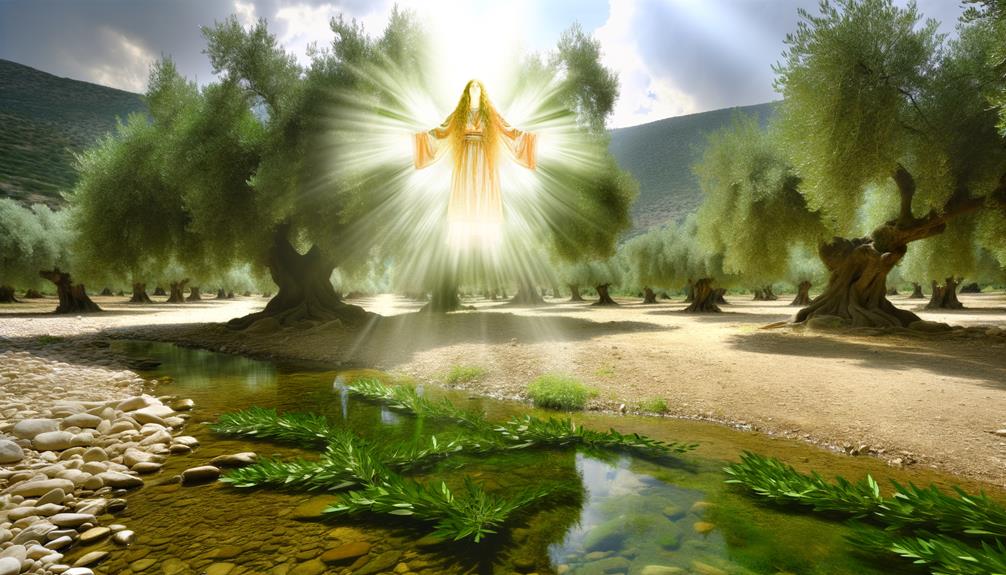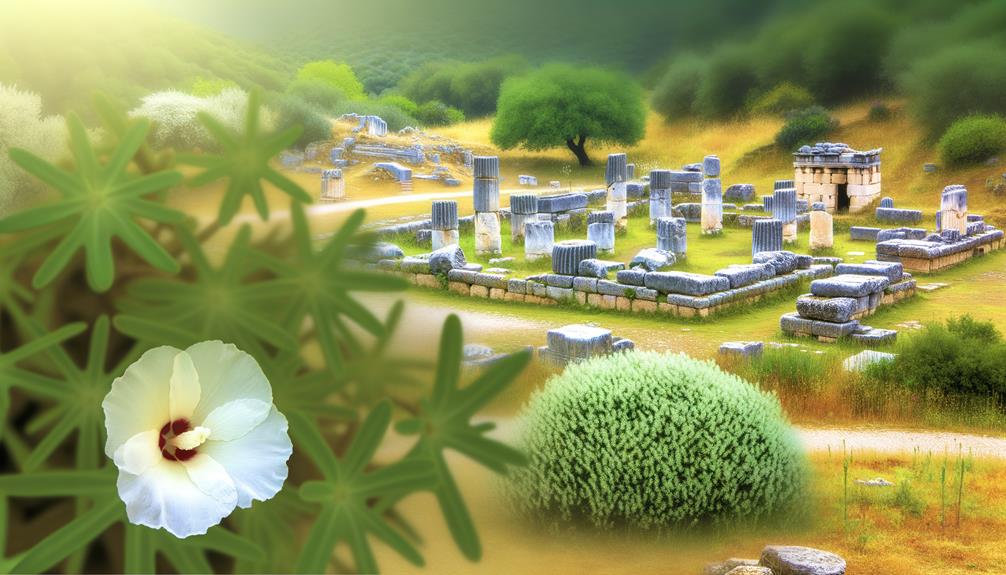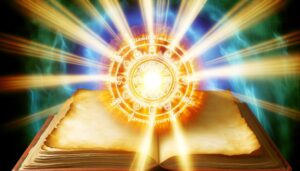Meaning of Althea in the Bible: Truth and Healing
The name Althea, though not explicitly mentioned in the Bible, encapsulates profound theological meaning rooted in its Greek origins. Deriving from ‘althos,’ meaning ‘healer’ or ‘wholesome,’ Althea embodies themes of healing, restoration, and divine grace deeply resonant with scriptural concepts.
These themes mirror biblical accounts of miraculous healings and spiritual rejuvenation, emphasizing God’s redemptive power and covenantal faithfulness. Althea also reflects early Christianity’s integration of existing cultural symbols to illustrate divine intervention and restorative grace.
Exploring further, one uncovers a richer tapestry of how such themes unify the message of divine compassion throughout biblical history.

Meaning of 7 Candles in the Bible: Symbolism and Spiritual Revelation
| Aspect | Details |
|---|---|
| Symbol | 7 Candles / 7 Lamps |
| Biblical Meaning | Completeness, divine perfection, fullness of the Holy Spirit |
| Key Scripture | Revelation 1:12-13, Revelation 4:5 |
| Spiritual Symbolism | Represents the sevenfold Spirit of God, guidance, and spiritual light |
| Tabernacle Reference | The menorah (Exodus 25:31-37) – seven-branched lampstand in the Holy Place |
| Prophetic Insight | Illuminates God’s presence, wisdom, and divine truth |
Etymology of Althea

The etymology of the name Althea can be traced back to ancient Greek origins, where it is derived from the word ‘althos,’ meaning ‘healer‘ or ‘wholesome.’ This linguistic heritage is not merely a semantic curiosity but intersects with theological and scriptural significance.
While Althea does not explicitly appear in Biblical texts, its meaning aligns with the healing and restorative themes prevalent in both Old and New Covenants.
The concept of healing is deeply rooted in Biblical narratives, from the miraculous healings performed by prophets like Elijah and Elisha to the ministry of Jesus Christ, who is often referred to as the Great Physician.
Consequently, the name Althea evokes a rich tapestry of spiritual and historical connotations associated with divine restoration and wholeness.
Althea’s Greek Origins

Rooted in classical antiquity, Althea’s Greek origins are intricately connected to the word ‘althos,’ underscoring its intrinsic association with healing and wholeness.
This etymological foundation is significant within the broader context of Hellenistic culture, where the name Althea frequently appeared in mythological narratives and medicinal lore.
In Greek mythology, Althaea was the mother of Meleager, whose story revolves around themes of life, death, and restoration.
This background enriches our understanding of Althea’s symbolic resonance, particularly when exploring its Biblical implications.
The name’s connotation of healing aligns with ancient Greek medicinal practices, where ‘althos’ was emblematic of remedies and restoration.
This dual heritage, both historical and linguistic, provides a profound backdrop for examining Althea within scriptural contexts.
Healing in Biblical Context

Healing in the biblical context encompasses both tangible medical practices and profound spiritual symbolism.
Scriptural narratives frequently illustrate the use of natural remedies and divine intervention as means of restoring health, reflecting a holistic approach to well-being.
Additionally, the symbolic aspects of healing often signify deeper spiritual realities, underscoring themes of redemption and divine mercy.
Biblical Healing Practices
In examining biblical healing practices, it is essential to contemplate the intertwining of divine intervention and the use of natural elements as depicted in various scriptures.
Within the Bible, healing is often portrayed as a manifestation of God’s power, exemplified through miracles performed by Jesus and the apostles, such as the curing of the blind (John 9:1-12) and the lame (Acts 3:1-10).
Additionally, biblical texts reference the use of natural remedies, such as the application of fig poultices in Isaiah 38:21 for Hezekiah’s boil.
This duality underscores a holistic approach to healing that integrates faith in God’s providence with practical, earthly remedies, reflecting the historical and cultural contexts of ancient biblical communities.
Spiritual Healing Symbolism
The concept of spiritual healing in the Bible is deeply embedded within the narratives of restoration and redemption, often symbolized through miraculous events that signify the transformative power of faith and divine grace.
Instances such as Jesus healing the blind (John 9:1-12) and the lepers (Luke 17:11-19) illustrate the profound link between physical healing and spiritual renewal.
The act of healing serves not only as an indication of God’s omnipotence but also as a metaphor for the soul’s liberation from sin and suffering.
Historically, these miracles underscore the belief in a compassionate, interventionist God who actively restores His creation, reinforcing the covenantal promise of salvation and eternal life.
Consequently, biblical healing transcends mere physical restoration, embodying spiritual rejuvenation.
Symbolism of Healing

Within biblical texts, the name Althea is often associated with the profound and multifaceted concept of healing, symbolizing both physical restoration and spiritual renewal. This symbolism is deeply rooted in scriptural narratives where divine intervention leads to the healing of individuals and communities.
The name Althea resonates with several key themes:
- Divine Compassion: God’s mercy in healing the afflicted.
- Faith’s Role: The importance of faith in the process of healing.
- Holistic Restoration: Healing that encompasses body, mind, and spirit.
Understanding Althea in this framework requires a nuanced appreciation of biblical healing as a divine act, often marked by miraculous occurrences and profound spiritual transformations.
Restoration in Scripture

The concept of restoration is a pervasive theme throughout Scripture, exemplified in narratives such as the return of the Israelites from Babylonian exile and the resurrection of Jesus Christ.
These instances not only highlight God’s redemptive power but also underscore themes of spiritual renewal and covenantal faithfulness.
Biblical Restoration Examples
Scripture abundantly illustrates God’s commitment to restoration through narratives such as the rebuilding of Jerusalem’s walls under Nehemiah’s leadership and the spiritual renewal of the Israelites. These biblical accounts serve as profound examples of divine intervention and human cooperation in the process of restoration.
Key examples include:
- Nehemiah’s Rebuilding of Jerusalem: Demonstrates the restoration of physical and communal integrity.
- Ezra’s Reformation: Focuses on spiritual and religious revival.
- Job’s Restoration: Highlights personal and material restoration after immense suffering.
These instances underscore God’s unwavering dedication to restoring His people, reaffirming both His promises and the pivotal role of faith and obedience in experiencing renewal.
Themes of Renewal
Examining the multifaceted themes of renewal in Scripture reveals a profound narrative of divine restoration that encompasses personal, communal, and national dimensions.
From the personal renewal of King David after his transgressions, as articulated in Psalm 51, to the communal revival of the Israelites returning from Babylonian exile, Scripture consistently underscores God’s redemptive plan.
Isaiah 61 highlights the promise of restoration, offering a vision of hope where ruins are rebuilt and former devastations are repaired.
The New Covenant continues this theme with Jesus’ transformative ministry, epitomizing spiritual renewal and societal restoration.
Historically, these themes resonate with the cyclical nature of Israel’s relationship with God, marked by periods of downfall and divine restoration, symbolizing ultimate redemption and renewal.
Divine Intervention

In the context of divine intervention, the name Althea in the Bible, though not explicitly mentioned, can be explored through its etymological roots and theological implications.
Derived from the Greek word ‘althos,’ meaning to heal, Althea symbolizes God’s intervention in human affairs through healing and restoration.
This aligns with biblical themes where divine intervention is evident in various forms:
- Miraculous healings: Instances where Jesus healed the sick, demonstrating God’s power and compassion.
- Providential guidance: Stories of God directing individuals like Moses and Elijah.
- Deliverance from danger: Narratives such as Daniel in the lion’s den.
Understanding Althea through these lenses underscores the profound impact of divine intervention.
Grace in the Bible

Grace in the Bible is fundamentally understood as the unmerited favor of God toward humanity, a concept deeply rooted in both Old and New Scriptures teachings.
Central to Christian theology is the manifestation of this grace through Jesus Christ, whose sacrificial life and resurrection offer redemption and reconciliation to humankind.
This theological cornerstone is illuminated in passages such as Ephesians 2:8-9, which underscores that salvation is a gift from God, not a result of human works.
Biblical Definition of Grace
Understanding the concept of grace in the Bible necessitates an exploration of its roots in both the Old and New Scriptures, where it is often depicted as an unmerited favor from God toward humanity.
The Hebrew term ‘chen’ in the Old writings and the Greek term ‘charis’ in the New writings are foundational to this understanding. Grace is multifaceted, encompassing God’s benevolence, forgiveness, and love.
Key scriptural references include:
- Exodus 34:6-7: God’s compassionate and gracious nature.
- Psalm 103:8-12: The boundless mercy of the Lord.
- Ephesians 2:8-9: Salvation as a gift through grace.
These passages collectively illustrate grace as a divine gift, underscoring its theological significance.
Grace Through Jesus Christ
Frequently, the New Covenant underscores that the ultimate manifestation of God’s grace is found through the life, death, and resurrection of Jesus Christ. This profound grace, as depicted in the New Scriptures, offers salvation and eternal life to all who believe (Ephesians 2:8-9).
Historically, Christ’s atoning sacrifice is central to Christian theology, fulfilling the Old Scriptures prophecies and establishing a new covenant of grace (Jeremiah 31:31-34). The Apostle Paul eloquently expounds on this in Romans 5:8, asserting that while humanity was still enmeshed in sin, Christ died for us, embodying divine grace.
Therefore, grace through Jesus is not merely an abstract concept but a transformative reality that redefines the relationship between God and humanity.
Cultural Significance

The cultural significance of the name Althea in a biblical context often intertwines with its roots in ancient Greek, where it symbolizes healing and wholesomeness.
Though Althea is not directly mentioned in the Bible, its connotations resonate deeply within Christian theology, embodying virtues that align with biblical teachings.
The name evokes a sense of spiritual nurturing and divine grace, elements that are central to Christian life. These associations enhance its cultural and spiritual relevance.
- Healing and Restoration: Althea signifies the healing power of faith.
- Wholesomeness: Reflects the completeness found in a life devoted to God.
- Virtue and Purity: Embodies the moral integrity encouraged in Scripture.
These layers of meaning enrich the name’s cultural significance in a biblical framework.
Historical Context

In exploring the historical context of the name Althea, one must consider its ancient Greek origins and subsequent integration into early Christian thought.
Deriving from the Greek ‘Althaia,’ meaning ‘healer‘ or ‘wholesome,’ the name was initially associated with figures from Greek mythology, such as Althaea, the mother of Meleager.
As Hellenistic culture permeated early Christian communities, names of Greek origin often found new significance within a biblical framework.
Although Althea is not explicitly mentioned in scriptural texts, its connotations of healing and wellness resonated with the Christian emphasis on spiritual and physical restoration.
This blending of Hellenistic and Christian traditions illustrates early Christianity’s ability to incorporate and reframe existing cultural elements within its theological and communal life.
Althea in Christian Tradition

Within Christian tradition, Althea’s connotations of healing and wholesomeness have been embraced as symbolic representations of Christ’s restorative power. This symbolism aligns with scriptural themes of healing found throughout the New Covenant, particularly in the miracles of Jesus. By integrating the notion of Althea, early Christians found a tangible expression of divine healing.
- Healing Miracles: Jesus’ acts of healing the sick (Matthew 14:14).
- Wholeness in Christ: Spiritual and physical restoration (John 10:10).
- Early Christian Symbols: Use of natural elements to signify divine intervention.
This alignment underscores the importance of healing in Christian doctrine, reflecting the holistic salvation offered by Christ.
Spiritual Implications

Althea’s symbolic resonance in the Bible offers profound spiritual implications, particularly in its embodiment of divine healing and restoration.
Scripturally, the name Althea, derived from the Greek word ‘althos’ meaning healer, mirrors the biblical themes of redemption and renewal.
Throughout both Old and New Covenants, God is portrayed as a healer—Jehovah Rapha—who restores physical, emotional, and spiritual wholeness.
Historically, early Christians may have associated Althea with the miraculous healings performed by Jesus and His apostles, signifying God’s ongoing intervention in human suffering.
Therefore, Althea serves as a theological emblem of God’s omnipotent grace, the promise of salvation, and the transformative power of faith.
This concept continues to inspire believers in their spiritual journeys today.
Conclusion
The name Althea, rooted in Greek origins, embodies the profound concept of healing, a theme that resonates deeply within biblical and Christian traditions.
Serving as an unparalleled symbol of restoration, Althea reflects the divine promise of renewal found throughout scripture. Its cultural and historical significance underscores the transformative power inherent in spiritual healing.
The exploration of Althea in this framework offers a panoramic view of its theological and historical dimensions, revealing an almost celestial significance in its interpretation.






